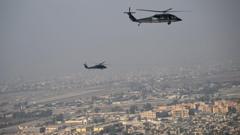In a significant move towards establishing a lasting peace in Ukraine, Prime Minister Sir Keir Starmer announced that military planning, aimed at supporting a prospective ceasefire, is entering an "operational phase." Following a virtual conference with 29 world leaders, Starmer affirmed that military commanders would convene in the UK to develop comprehensive strategies to back a peace agreement and safeguard Ukraine's future security.
Military Strategy for Ukraine Peace Deal Advances, Says Starmer

Military Strategy for Ukraine Peace Deal Advances, Says Starmer
Prime Minister Sir Keir Starmer reveals plans for military preparations to secure a potential ceasefire for Ukraine.
This development comes in the wake of Ukraine accepting a 30-day ceasefire agreement during discussions with the United States. Russian President Vladimir Putin has expressed his support for a ceasefire but has attached specific pre-conditions that must be met. Ukrainian President Volodymyr Zelensky, who participated in the previous discussions, stressed the necessity for "active pressure" on Russia, calling it the sole impediment to peace.
Zelensky asserted that the peace process must commence without conditions and urged European nations to ramp up their weapon production and collaborate with the U.S. to expedite a deal through stringent sanctions and pressure on Russia. Sir Keir echoed this sentiment, explaining that "the world needs actions, not mere words." He condemned the Kremlin’s "dithering and delay" regarding the ceasefire and emphasized that ongoing Russian aggression is inconsistent with Putin's professed interest in peace.
In a collective effort, global leaders concluded that if Russia fails to accept an "immediate and unconditional ceasefire," there would be a concerted effort to increase pressure on Putin to engage in negotiations. Sir Keir elaborated on this by stating that military support for Ukraine would be intensified, sanctions on Russian revenues would be tightened, and all appropriate channels would be pursued to ensure accountability for the destruction caused in Ukraine.
During discussions, Putin indicated his agreement with the ceasefire concept but raised several questions concerning the details, such as whether it would enable Ukraine to rearm and who would monitor compliance.
The summit participants included NATO, the European Union, and leaders from nearly two dozen European nations, alongside Canada, Australia, and New Zealand. Sir Keir noted that military chiefs would formulate actionable support plans to aid Ukraine’s defenses. He introduced the notion of a "coalition of the willing" to ensure compliance with any ceasefire, which has gained further backing from nations like Japan.
The Prime Minister has previously expressed his willingness to deploy UK troops to help ensure security in Ukraine as part of a peace agreement, urging other European countries to provide concrete security assurances, supplemented by a U.S. "backstop."
In comments following the summit, Zelensky acknowledged the necessity for potential troops on the ground post-ceasefire, despite some skepticism regarding this idea. Meanwhile, Finnish President Alexander Stubb cautioned that it was premature to consider troop deployments until a ceasefire and peace negotiations are firmly established, suggesting there are numerous alternatives for supporting the peace effort.
Since Russia's large-scale invasion of Ukraine in February 2022, the conflict has resulted in substantial casualties, highlighting the urgency for a viable resolution.
Zelensky asserted that the peace process must commence without conditions and urged European nations to ramp up their weapon production and collaborate with the U.S. to expedite a deal through stringent sanctions and pressure on Russia. Sir Keir echoed this sentiment, explaining that "the world needs actions, not mere words." He condemned the Kremlin’s "dithering and delay" regarding the ceasefire and emphasized that ongoing Russian aggression is inconsistent with Putin's professed interest in peace.
In a collective effort, global leaders concluded that if Russia fails to accept an "immediate and unconditional ceasefire," there would be a concerted effort to increase pressure on Putin to engage in negotiations. Sir Keir elaborated on this by stating that military support for Ukraine would be intensified, sanctions on Russian revenues would be tightened, and all appropriate channels would be pursued to ensure accountability for the destruction caused in Ukraine.
During discussions, Putin indicated his agreement with the ceasefire concept but raised several questions concerning the details, such as whether it would enable Ukraine to rearm and who would monitor compliance.
The summit participants included NATO, the European Union, and leaders from nearly two dozen European nations, alongside Canada, Australia, and New Zealand. Sir Keir noted that military chiefs would formulate actionable support plans to aid Ukraine’s defenses. He introduced the notion of a "coalition of the willing" to ensure compliance with any ceasefire, which has gained further backing from nations like Japan.
The Prime Minister has previously expressed his willingness to deploy UK troops to help ensure security in Ukraine as part of a peace agreement, urging other European countries to provide concrete security assurances, supplemented by a U.S. "backstop."
In comments following the summit, Zelensky acknowledged the necessity for potential troops on the ground post-ceasefire, despite some skepticism regarding this idea. Meanwhile, Finnish President Alexander Stubb cautioned that it was premature to consider troop deployments until a ceasefire and peace negotiations are firmly established, suggesting there are numerous alternatives for supporting the peace effort.
Since Russia's large-scale invasion of Ukraine in February 2022, the conflict has resulted in substantial casualties, highlighting the urgency for a viable resolution.





















